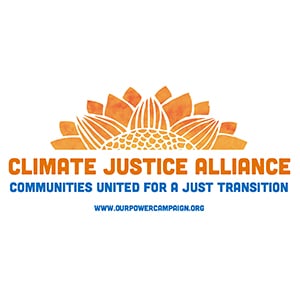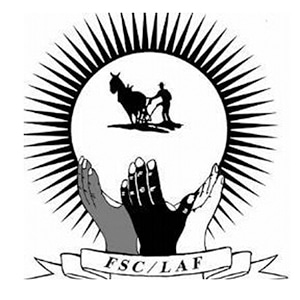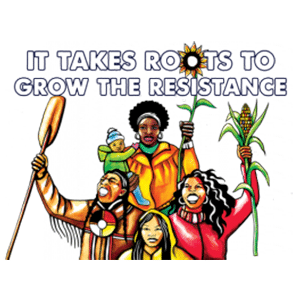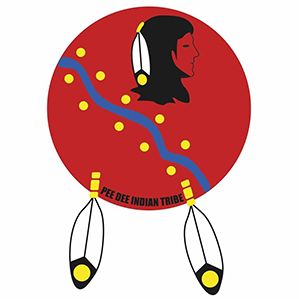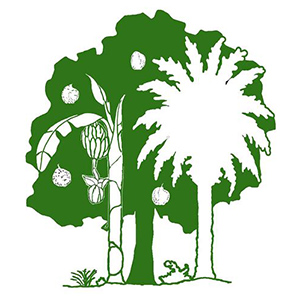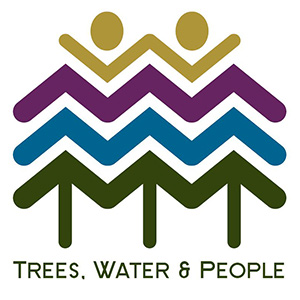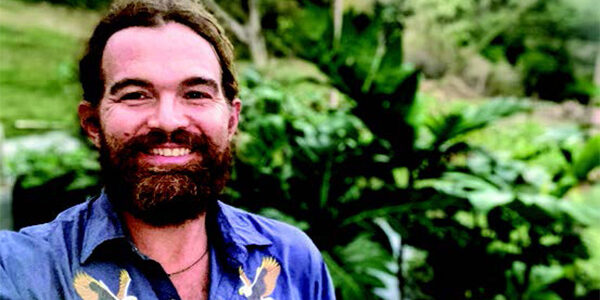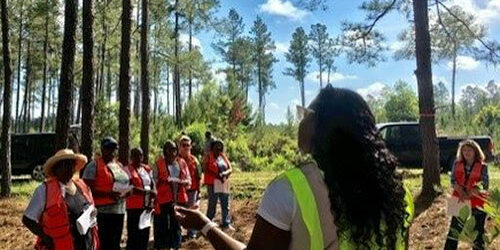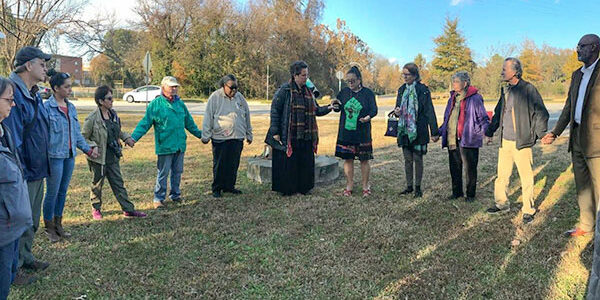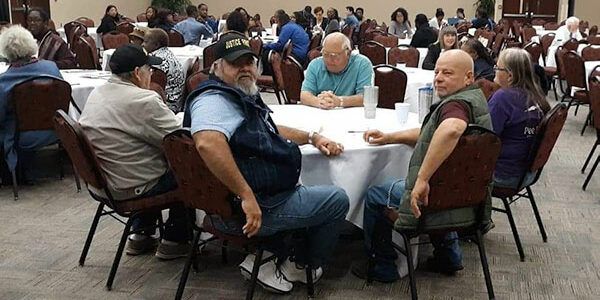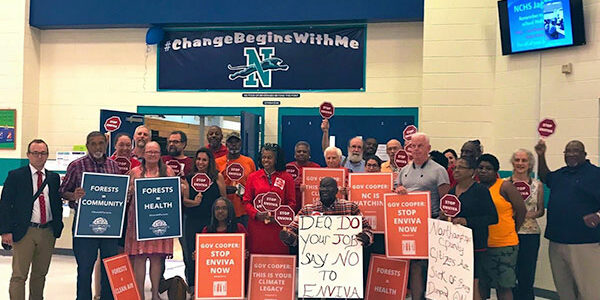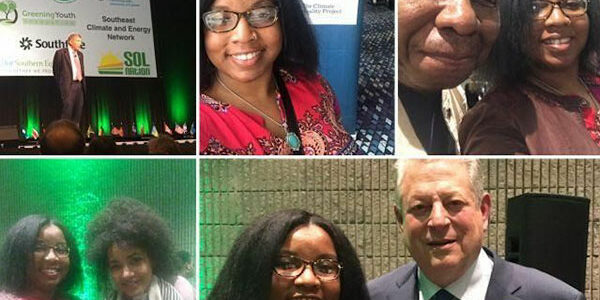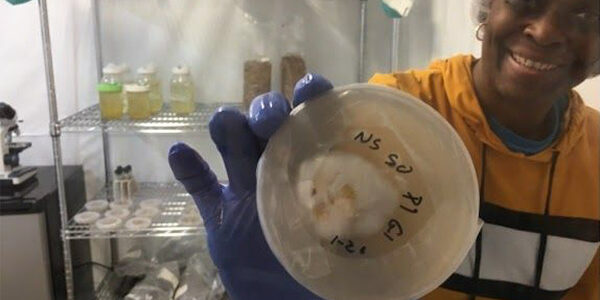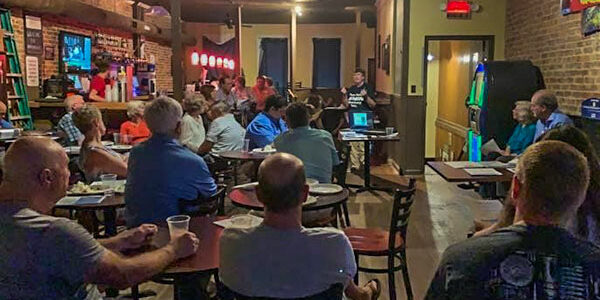Photo credit: Lisa Merton
Deforestation is a major contributing factor to climate chaos, biodiversity loss, soil damage, water pollution, and the destabilization of forest dependent communities. Yet U.S. and global energy and climate policy and practice increase the demand for industrial biofuels and wood, placing forests under threat and pressure. We cannot increase the demand for wood and believe that we will reduce deforestation. We cannot replace forests with genetically engineered (GE) trees and and protect genetic diversity of forests. We cannot replace biodiverse forests with monoculture tree plantations, reliant on pesticides and fertilizers, and imagine that we are protecting soil and water quality, providing essential habitat for biodiversity, or healthy livelihoods for people.
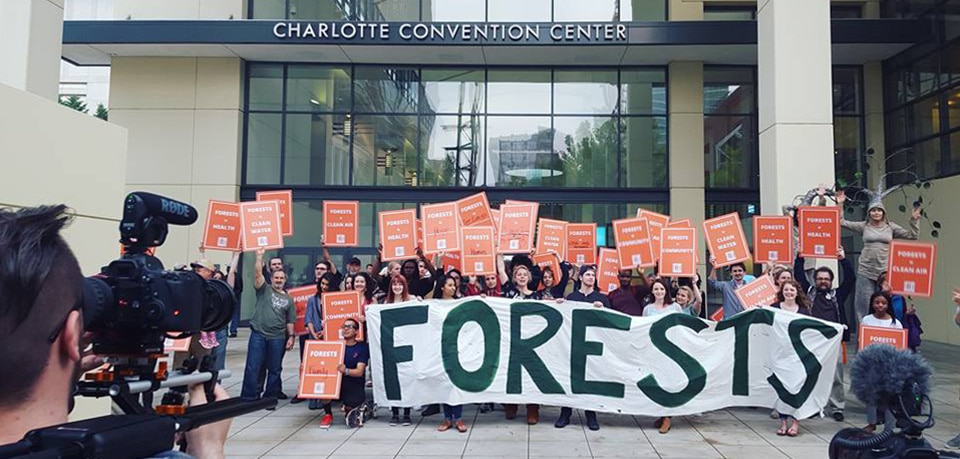
Simply put, we must choose. GE trees and tree plantations are no substitute for the myriad complex functions of a forest. A true forest is a wonderful, magnificent wild of the known and unknown and cannot be replaced. Ceres Trust provides support to organizations and movements that protect forests for us all.
GRANTEE PARTNERS
Resources
Genetically Engineered Trees: The New Frontier of Biotechnology is a report published by the Center for Food Safety. This groundbreaking report looks at the recent push for the commercialization of GE trees by biotech, energy, and paper companies and exposes the truth behind industry claims that these GE trees promote "environmental sustainability."
Great American Stand: U.S. Forests and the Climate Emergency is a report published by the Dogwood Alliance describing why the United States needs an aggressive forest protection agenda focused in its own back yard.
Resources on GE Trees, compiled by the Campaign to Stop GE Trees.
Save Our Roots is an indigenous people’s campaign to save our natural forests.
Trees, Trash and Toxics: How Biomass Energy has Become the New Coal, a report by the Partnership for Policy Integrity.
The Restoration of the American Chestnut (pdf): The American Chestnut faced devastation from a fungus (blight), introduced in 1904. After thirty years of traditional plant breeding, scientists have successfully developed a blight-resistant American Chestnut, with the first potentially blight-resistant chestnuts harvested in 2005.
The BEAI Fund was born out of a shared recognition that in order for the environmental movement to be successful, it must support and resource grassroots groups to institutionalize community-based solutions to the ecological crisis. The BEAI will move $10 million towards advancing the climate and environmental justice movements.
Stories from the Field
Trees That Feed: Tree Planting in St. Croix
As part of the Hurricane Maria recovery process, Trees That Feed were asked to supply trees. Since then, TTFF has been actively involved with Ridge to Reef, a certified organic farm owned by Nate Olive. TTFF supplies breadfruit saplings to Nate, who grows them to a sturdy size, then finds good forever homes for the trees. The trees go to farmers, not-for-profit organizations and the University of the Virgin Islands.
McIntosh SEED’s Teas and Trees Program
McIntosh SEED’s “Teas and Trees” program is continuing to experience growth. The program was created specifically for women, girls, and the NextGen of landowners of African-American landowners. The program is designed to educate, empower and encourage women and girls to be good stewards of the forested lands that they own or will inherit.
Concerned Citizens of Richmond County: Reflections Event
In 2019, NC DEQ issued 3 permits to allow Enviva to expand in North Carolina. In November, we held a press conference to share our experience of being impacted by Enviva’s facilities. After the press conference, we held a community reflections event to hear from and support people who are directly or indirectly impacted by Enviva and other extractive industries.
Pee Dee Tribe Represents Tribal Culture and Tradition
We had the opportunity to attend different events. One of them was The Creating Climate for Change Conference in October of 2019. We were able to represent tribal culture and tradition, by performing several dances that showed our traditions and culture. Also, we had the opportunity to disseminate the message about the importance of leaving forests and wetlands standing and connected with our tribe culture of respecting nature.
Community Engagement and Capacity Building
JAPRI (Jail and Prison Rehabilitation Information) participated in community engagement and capacity building effort in Northampton County, NC with Dogwood Alliance in August 2019.
Sol Nation Climate Reality Training
Sol Nation, Dogwood Alliance, and other partners partnered with Climate Reality to get people from North Carolina to Atlanta for the Climate Reality Training. We had significant representation by our circle.
Sandhills Cooperation Association’s Mycelium Lab
SCA held a workshop on the income potential of growing mushrooms and the opportunity to form a mushroom growers co-op. This led to a dozen farmers expressing interest in being co-op growers.
Lakeland Citizens for Clean Air, Inc. Public Meeting
We held a public meeting at a local venue to illustrate the problem that industrial biomass is posing to the world via a powerpoint presentation which attracted 40 people.
Video
McIntosh S.E.E.D: Community Forest
McIntosh S.E.E.D.’s 1,148-acre forest was acquired in 2015 in partnership with The Conservation Fund and is the first Black-owned community forest in the US. Through the educational work it does onsite, the nonprofit aims to amplify the voices of Black and Brown landowners in the conservation movement. Read more...
The Justice First Tour
The Justice First Tour called for a strong network of grassroots organizations working together to advance climate justice and forest protection, with a focus on 100% clean energy for 100% of the people. The 2018–2019 tour and follow up activities engaged over 300 organizations in 25 cities and 12 Southern States.
Taking Root: Wangari Maathai
Taking Root: The Vision of Wangari Maathai is an in-depth film about Kenyan Nobel Peace Prize Laureate Wangari Maathai. Made during the last decade of her life, the film portrays how her act of planting trees, along with her commitment to education and the empowerment of women, grew into a nationwide movement for environmental and human rights. Directed and produced by Alan Mater and Lisa Merton.






